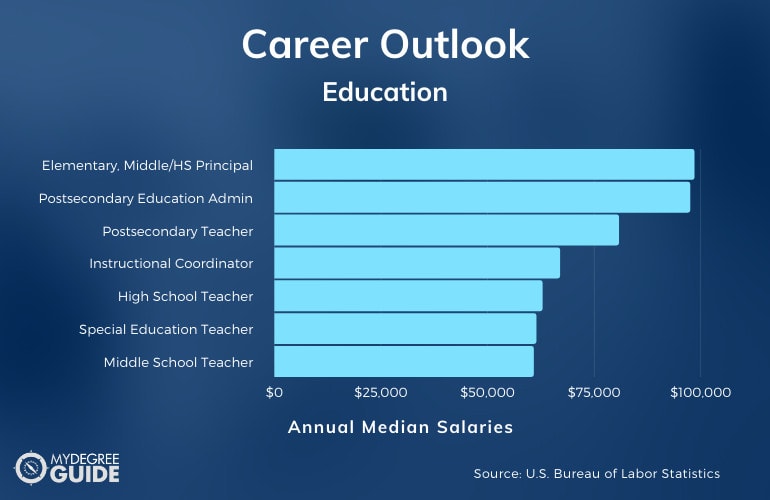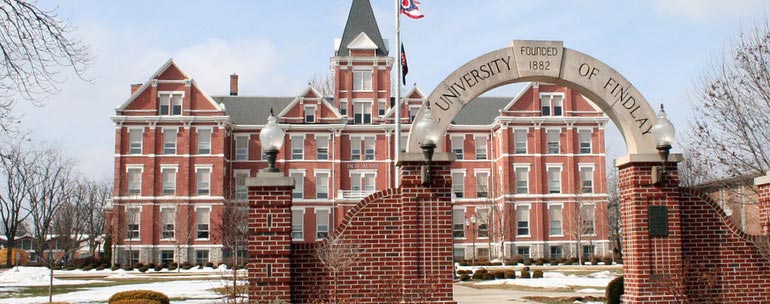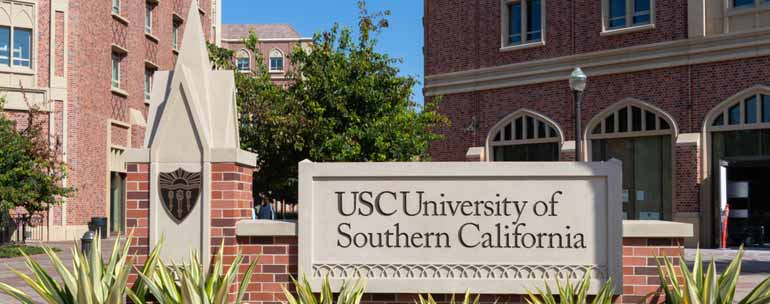If learning, in all its techniques and modalities, is your passion, and you want to become qualified to work in the education field quickly and conveniently, then 1 year online masters in education programs are worth considering.

With a wide variety of careers in teaching and administration, and many universities offering accelerated online masters degrees in education, this route may work well for many people.
Editorial Listing ShortCode:
Let’s explore the field of education as a whole, as well as how a master’s degree in education can help you achieve your goals.
1 Year Online Masters in Education Programs
Education is often a very fulfilling field in which to work, but it’s critical to identify your niche in order to pursue your masters degree because there are many different options.
- Early Childhood Education
- Educational Administration
- Elementary Education
- Higher Education
- Special Education
Those with a masters degree online in education may become a teacher or work in K-12 school or higher education administration. Here are several education degree options to consider.
Early Childhood Education

An early childhood education master’s degree can help prepare you to teach children from pre-K to 4th grade.
This may involve learning about early childhood human development to give you a greater understanding of your students, along with teaching strategies in math, science, social science, and literacy.
Editorial Listing ShortCode:
A great program can help prepare you to work with a wide variety of students, including English language learners and those with disabilities. Programs also typically have the opportunity for you to gain hands-on teaching experience and to earn a teacher certification.
The program courses can help prepare you for your important role as a teacher and will typically include child and adolescent development, cognitive development, classroom management, subject-specific education courses, teaching students with disabilities, and teaching students with English as their second language.
Educational Administration

A masters in education administration degree program may also prepare students for leadership positions in K-12 schools.
In addition to a career as a school principal, this degree can often lead to other leadership positions, like an assistant principal, business administrator, curriculum and instruction director, or academic department supervisor.
Due to state and federal regulations, schools often need leadership that can adapt to change, are mission-focused, and can act strategically, so programs are often geared to developing those skills.
Editorial Listing ShortCode:
The education of children is an extremely important responsibility in our society, requiring school administrators to have a high degree of integrity and to take their leadership role seriously.
An educational administration degree may prepare students to meet this responsibility with courses in educational law, research, school resource management, staff development, instructional strategies, human resource management, and special education leadership.
Elementary Education

Many elementary education masters degrees are designed to allow the student to earn a graduate degree and a teacher certification simultaneously.
A great program should not only educate you about teaching techniques and pedagogical methods but also prepare you for the work of researching current teaching practices to allow you to constantly improve yourself as an educator.
Editorial Listing ShortCode:
Courses in an elementary education program typically include digital education, education and computers, human development, educational psychology, urban education, and classroom organization.
You may also take more specific coursework in teaching art, social studies, science, math, and literacy. Many programs also give you the opportunity to work in the field, giving you teaching experience to help prepare you for your role as an educator.
Higher Education

An online master’s degree in higher education may prepare you for administrative positions at colleges and universities. This program may teach you about college operations, from how academic programs are built, evaluated, and grown to access and equity in higher education.
There are many facets to higher education administration, giving you many paths to choose from for your specialization, whether you want to work directly with students in admissions or advising, or take a back of the house role in institutional research or public relations.
With this degree, you may also pursue work in career advising, recruitment, student life, financial aid, business services, diversity affairs, or alumni engagement.
Editorial Listing ShortCode:
Students in a higher education program typically take some introductory courses to education as well as more specialized courses in law and policy, leadership, pedagogy, digital education, counseling, research, and planning and assessment.
With federal and state laws affecting higher education, along with stringent accreditation standards, colleges and universities are increasingly gaining complexity. These courses may offer you an in-depth look at how colleges operate and meet their educational mission to prepare you for your own leadership role.
Special Education

A masters degree in special education can help prepare you for the very important and challenging work of educating children with disabilities. Highly qualified and committed special education teachers are in great need.
A special education program helps teachers become experts on the unique needs of their students. Programs may emphasize the socio-cultural elements that impact the education of special needs students, giving you an even broader look at this specialized form of teaching.
Editorial Listing ShortCode:
Students in a special education degree program usually take an introductory course to special education, along with courses in child and adolescent development, assessment, special education research, research methods, and language and literacy instruction.
Many program courses deal with teaching students with different types of disabilities and different ranges in severity. This may give you good preparation for the difficult but often fulfilling work of a special education teacher.
Masters in Education Careers & Salaries

According to the Bureau of Labor Statistics, a master’s in education may lead to a variety of careers, whether you see yourself in the classroom working directly with students, or in a leadership or administrative role, making sure that your institution is operating effectively.
Many of the occupations listed below only require a bachelor’s degree in education. But if your bachelors is not in education, then one year masters programs in education may be a strategic way to gain entry into the education field.
| Careers | Annual Median Salaries |
| Elementary, Middle, and High School Principal | $98,490 |
| Postsecondary Education Administrator | $97,500 |
| Postsecondary Teacher | $80,790 |
| Instructional Coordinator | $66,970 |
| High School Teacher | $62,870 |
| Special Education Teacher | $61,420 |
| Middle School Teacher | $60,810 |
| Kindergarten and Elementary School Teacher | $60,660 |
| Career and Technical Education Teacher | $59,140 |
| Adult Literacy and High School Equivalency Diploma Teacher | $55,350 |
This field is filled with many occupations that people find to be worthwhile, not only in compensation but also in job satisfaction. A masters degree in education may qualify you to work as a teacher of students as young as kindergarteners and as old as high school seniors.
You may also teach education to college students at a community college. Some universities also only require a masters degree for those teaching part-time.
If education is your passion and you see yourself in one of these exciting and essential jobs and want to start your career as soon as possible, then one year online masters in education programs may be worth considering.
Choosing a 1 Year Online Masters in Education Program
Completing a master’s degree in only one year can be challenging, so choosing the right program for you is critical.
Editorial Listing ShortCode:
You may want to consider the following when choosing your program:
- Faculty to Student Ratio: Completing a master’s degree in one year can be challenging, and the faculty to student ratio is often an indicator of how hands-on the faculty are and to what degree they can work with students individually.
- Teacher Certification: If your goal is to be a school teacher and you don’t already have your teacher certification, you can look for a program where students can earn a master’s degree and teacher certification simultaneously. You may want to make sure your chosen program will fulfill your state’s teacher certification requirements.
- Cost: Affordability is top-of-mind for most students, so you can compare the tuition and fee rates of the programs you’re considering and determine how you will fund your education.
While these factors are important to take into consideration when choosing your program, it’s crucial to explore what your own priorities and needs are for your graduate program.
What’s important to you may not be as important to another student, so take a deep dive into your specific goals and aspirations and if your chosen graduate program will take you there.
Curriculum & Courses

Regardless of your goals and which program you choose, your courses will generally focus on preparing you to be an effective educator or education administrator and giving you the practical skills that may make you exceptional in your field.
Here are examples of courses you should expect to take.
- Budget and Resource Allocation: In an educational administration program, students will learn how to appropriately allocate the school’s resources, maximize the funds available, and communicate budget priorities to parents, teachers, and taxpayers.
- Education Law: An educational administration program will also offer courses on the laws that govern and affect school systems and how school administrators remain in compliance.
- Student Success: A higher education program will usually include courses on student support services and retention initiatives that will benefit and meet the needs of a diverse student body.
- Program Planning and Assessment: Students in a higher education program might learn how to make data-driven decisions that drive institutions forward by improving academic and support services and meeting accreditation and other regulatory requirements.
- Early Childhood Development: In an early childhood education program, students will take an introductory course on the human development of children. This course will usually explore the expected and anomalous development of language and social skills, along with how teachers can support children’s development and learning.
- Instructional Design: Teacher training programs will include several courses on the different modes of learning and how to gear instruction to work with many learning styles.
- Behavioral Management and Intervention: This course is typical for a special education program and will focus on strategies to effectively teach students with disabilities that affect their emotions and behaviors.
- Inclusive Teaching: Special education courses will also focus on how teachers can ensure that teaching strategies and accommodations will allow all students to learn, including those with disabilities.
- Teaching Bilingually: For those seeking a teacher certification in language learning, a course on teaching English language learners and strategies on using the students’ first and second languages will be helpful.
- Introduction to Mathematics Education: For those specializing in teaching a specific subject, introductory courses on the best practices for teaching that subject, along with the current research on teaching methods, often will be required.
These courses can be fascinating, and their value lies in the direct impact they may have on making you a successful and effective educator.
Admissions Requirements

Most education programs in administration or leadership may not have particularly specialized admissions criteria, but you can expect the following components to your admissions application.
- Statement of Goals: You will usually need to compose an essay on your educational and career aspirations and how the program will help you achieve your goals.
- Recommendations: Recommendation letters are usually required. Your college or university will specify whether they may come from academic, professional, or personal sources.
- Bachelor’s Degree Transcripts: Official transcripts from the college or university where you earned your bachelor’s degree are requested.
- Test Scores: Some masters degree programs in teaching may require Praxis exam test scores.
Transcripts, an essay, and recommendations are usually the core requirements of a master’s degree program, but some university teaching programs may require the Praxis exam, and programs sometimes require Graduate Record Examination (GRE) test scores.
Accreditation

You can look into the accreditation status by a regional accrediting organization of your chosen college or university early in the admissions process.
This is critical because accreditation is often looked at as a “stamp of approval” by employers, your state (if you’re in a teaching program), and other colleges and universities to which you may transfer.
Editorial Listing ShortCode:
Accreditation is an indication of the quality of a university because they must work to maintain their accreditation status by evaluating their programs, setting data-driven goals for improvement, and assessing whether their services are effective.
Financial Aid and Scholarships

While undergraduate students often have several forms of federal and state financial aid that they may qualify for (including grants that do not need to be paid back), graduate students usually consider federal student loans by completing the Free Application for Federal Student Aid (FAFSA).
Scholarships are another excellent option to inquire about. Many universities have a robust scholarship program, and even grants that may be available to graduate students, so it’s important to take that into consideration when choosing your one year education masters program.
What Can You Do With a Masters in Education?

According to the Bureau of Labor Statistics, there are many occupation possibilities in K-12 schools, including special education, elementary, middle, and high school teachers. In addition to teaching roles, someone with expertise in school administration may become an assistant principal, principal, or instructional coordinator.
In higher education administration, the occupation opportunities are even more broad. With a degree in higher education administration, you may work as an academic advisor, admissions counselor, recruiter, diversity officer, or institutional research manager, depending on your skills and experience.
How Much Does an Online Masters in Education Cost?
Tuition and fee rates vary across universities, but you can expect to pay anywhere between $470 to $830 per credit, in addition to fees.
When choosing your program, it’s important to weigh the costs versus the reward and recognize the investment that you will be making in yourself, your career, and your earning potential. You may also consider the scholarship, grant, and student loan opportunities that may be available to you.
Are There Any Affordable One Year Online Masters in Education Programs?

While there is a wide range of tuition and fee rates among universities, there are affordable programs, and you can expect to pay around $470 per credit, plus fees.
How to fund your education is an important question to answer when considering your program. Know that many students are able to make graduate school possible through loans, scholarships, and grants.
What is the Shortest Masters Degree Program?
The shortest masters program is typically 30 credit hours. To complete 30 graduate credits in one year, you may need to be dedicated to your success and work closely with your faculty advisor to ensure that you’re meeting all graduation requirements in that timeframe.
While some students need to take much more time to complete their degree due to work or family obligations, if you can devote a year to your studies, then you may leave with a degree that can help catapult you to your goals.
Is a Masters in Education Worth it?

Yes, a masters degree in education is worth it for many students. For the next decade, the Bureau of Labor Statistics reports a 5% job growth in education, training, and library occupations, faster than the average overall job growth.
Common education careers include school principal, college administrator, instructional coordinator, special education teacher, and elementary, middle, or high school teacher.
Editorial Listing ShortCode:
There can be many benefits to working in this field, including the personal fulfillment that comes with knowing you are making a difference in students’ lives and that your work is helping to fulfill the essential role that education plays in our society.
Universities Offering 1 Year Online Master’s in Education Degree Programs
Methodology: The following school list is in alphabetical order. To be included, a college or university must be regionally accredited and offer degree programs online or in a hybrid format.

California Baptist University’s online master’s degree program in education balances advanced pedagogical instruction with practical application. Students expand their career options while obtaining a wide range of classroom skills and formal experience. This affordable program can be completed in just 12 months.
California Baptist University is accredited by the Western Association of Schools and Colleges Senior College and University Commission.

Canisius College’s online master’s degree program in Teaching English to Speakers of Other Languages (TESOL) prepares students to excel in the K-12 classroom setting. Under a flexible schedule, Canisius students become experts in English linguistics and excel in translating grammars to ESL students.
Canisius College is accredited by the Middle States Commission on Higher Education.

Concordia University’s Master of Arts in Education leads the way in developing new classroom and curriculum strategies so that their graduates can be leading educators. This 1 to 2 year degree program offers 30 units of completely online classes based on critical thinking skills, practical experience, and advanced pedagogy.
Concordia University Irvine is accredited by the WASC Senior College and University Commission.

At Cumberland University, students receive a Master of Arts in Education that provides them with every tool they need to be balanced, successful educators. This awarded program offers flexible classes on a variety of pedagogical and practical topics.
Graduates prove their excellence in advancing student outcomes and providing a caring learning environment.
Cumberland University is accredited by the Southern Association of Colleges and Schools Commission on Colleges.

National University offers two scheduling tracks for its Master of Education, including an accelerated track that allows students to potentially finish in 1 year. Whether at the standard or accelerated level, the program aims to provide a balanced education that covers the necessary elements to provide a positive learning environment.
National University is accredited by the WASC Senior College and University Commission.

San Diego State University’s Master of Arts in Teacher Leadership program focuses teachers to better serve their peers and communities as they serve their students. This 12 to 14 month program centers on professional development for teachers who are confident in the classroom and want to translate their skills outside of the classroom.
San Diego State is accredited by WASC Senior College and University Commission.

The University of Findlay’s online Master of Arts in Education degree program allows for a quality postgraduate education at a flexible schedule. Students can choose from a variety of emphasis topics to become experts in specific areas in the field of education. This degree can be finished in as quickly as 18 months.
The University of Findlay is accredited by The Higher Learning Commission.

At the University of Southern California, the Master of Arts in Teaching online degree prepares K-12 teachers with the necessary pedagogical skills to lead classrooms in a positive learning environment. Students concentrate between elementary and secondary education, mixing practicum and theory for a well-rounded education.
USC is accredited by the Western Association of Schools and Colleges.

Walden University’s Master of Science in Education is a CAEP accredited program that offers a traditional, accelerated, and 1 credit pace designed to be accessible to a variety of students. A highly qualified faculty teach a specialized curriculum based around pedagogy, leadership, and practical development of classroom skills.
Walden is accredited by The Higher Learning Commission.

Western Governors University’s Master of Science in Curriculum and Instruction is an affordable online degree that can be finished in as little as 18 months. Students learn how to excel in one-to-one work with K-12 students as well as how to become leaders in their school and communities.
Western Governors University is accredited by the Northwest Commission on Colleges and Universities.
Getting Your Masters in Education Online in One Year

With such a wide variety of occupations to choose from, along with the fascinating degree program courses, a one year masters in education degree may prove to be a great investment of your time and money.
This degree may lead to career opportunities in school administration, higher education administration, or teaching, in all its facets and variations. You may envision your career one way, but this field is so diverse and ever-changing, that your career may grow and develop with you.
If you love to learn and love to watch others learn, then a degree and a career in education may be a great option for you to consider.

